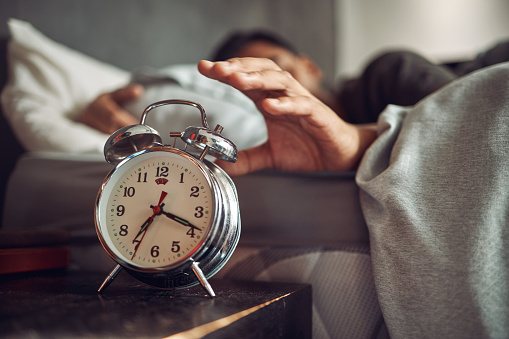In a scientific study, many scientists are putting their science-backed opinion to solve the mystery of precise sleeping.
Dr Robert Stickgold, professor of psychiatry at Harvard Medical School, Boston, United States, said that many people came to me just to know why they wake up automatically without any alarm clock when they have to do something important in the morning.
Image credits: Unsplash
According to Dr Robert Stickgold, “This is one of the topics in sleep research where everyone in the profession seems to believe that what is true cannot be true.”
Stickgold recalls bringing it up to his professor when he was just beginning out in the industry, only to be met with a skeptical look and a less-than-satisfactory answer. “I can promise you that all of us sleep researchers say ‘balderdash, it’s impossible.”
Nonetheless, Stickgold admits there is something to it. “Hundreds and thousands of people, including myself, have reported this type of precision waking,” he says. “I can get up at 7:59am and turn off the alarm before my wife gets up.” At least occasionally.
Of course, it’s common knowledge that humans have an extensive set of internal mechanisms that assist our bodies to keep time.
These systems, which are influenced by our exposure to sunshine, caffeine, meals, exercise, and other stimuli, govern our circadian rhythms throughout the roughly 24-hour cycle of day and night, affecting when we go to bed and wake up.
What is the circadian rhythm
“Circadian rhythms are 24-hour cycles that run in the background of the body’s internal clock to carry out critical tasks and processes. The sleep-wake cycle is one of the most significant and well-known circadian rhythms.”
What do the previous studies tell us?
A study in 15-person in 1979 for 2 nights discovered that the subjects were able to wake up within 20 minutes of the objective more than half of the time. The two subjects who performed the best were subsequently observed for another week, but their efficiency quickly declined.
Another short trial allowed participants to determine when they’d wake up and found that almost half of the spontaneous awakenings occurred within seven minutes of the option they’d written down before going to bed.
Role of stress hormones in the sleep
To find out the role of stress hormones in sleeping patterns, Jan Born, the director of the department of medical psychology and behavioral neurobiology at the University of Tubingen, Germany, and his team found 15 people who typically wake up at 7 or 7:30am were identified, kept in a sleep lab, and their blood was drawn throughout three nights.
The subjects were split into three groups: one group was given a wake-up time of 9am and was unexpectedly awakened at 6am the other two groups were given wake-up times of 6am and 9am respectively.
Born claims that when their wake-up time got closer, a noticeable change appeared. The subjects who planned to get up at 6am experienced a noticeable increase in adrenocorticotropic hormone (ACTH), a hormone that regulates the stress hormone, cortisol concentration starting around 5am.
According to Born, it appeared as though their bodies were signaling a need to rise early. With a smile, Born explains, “This is a good adaptive anticipatory reaction of the organism. You have enough energy to deal with getting up, and you can make it till you have your first coffee.”
Members of the group who didn’t plan to wake up early but were startled awake at 6 a.m. didn’t experience the same rise in stress hormones before waking up. The third group, which was given a 9 a.m. wake-up time, didn’t experience a noticeable increase in ACTH an hour prior to rising. Born claims that the fact that it was so late in the morning prevents the observation of the same impact.
However, Dr. Robert Stickgold says that this enigma is truly a scientific mystery.
To ‘science-up’ your social media feed, follow us on Facebook, Twitter or Instagram!




